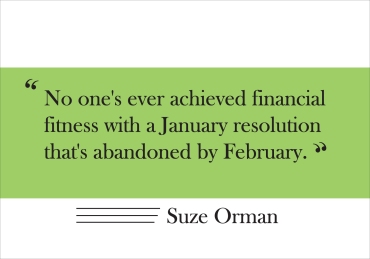“No one’s ever achieved financial fitness with a January resolution that’s abandoned by February.” ―Suze Orman. While a lucky few may have transcended this proverbial warning, by and large, it’s a pretty good rule of thumb. According to the Stress in America survey published by the American Psychological Association (APA) in November 2017, 62% of Americans report being stressed about money. Since making financial resolutions can sometimes be intimidating, why not make 2018 the year you commit to reducing your stress? Here are a few items to check off your list on the path to a happier, more peaceful year (and beyond).
Don’t wait to pay your bills.
It’s never a good feeling when you go to pay a bill only to find that your account balance is insufficient, or close to it. (This, by the way, is why you should make sure your bank offers account alerts that notify you when your balance hits a specific target.) Taking care of financial commitments before any extracurricular spending is not only the responsible thing to do, it’s also a good budgeting habit. You’ll have a better sense of where you stand, and avoiding late payments will also prevent late fees and blemishes to your credit score. In fact, paying down debt is one way to improve your credit score. Two tools your bank should offer that will assist you in this process are Direct Deposit — for instant access to your paycheck or social security funds — and Automatic Bill Pay, so you can set it and forget it.
Give yourself some credit.
Bad credit is bad; good credit is good. But how does it impact you? Well, in a number of ways. Having poor credit is connected to higher interest on car loans, mortgages, credit cards and other loans. No credit is also bad. For example, according to the 2017 Auto Insurance & Credit Score Report, on average, people with no credit pay 65% more for car insurance than people with excellent credit. Drivers with no credit pay at least twice as much in New Jersey. Your credit standing can also impact your insurance premiums, a landlord’s decision to rent an apartment to you, and other major occurrences. Essentially, having poor or no credit equates to more money out of your pocket. The good news is that you can always improve your credit score! The most common way to accomplish this is to maintain an open credit card account that is in good standing. Ask your credit card issuer(s) how they define “good standing,” but it typically means making at least the minimum payment by the due date each month. In some cases, it may include keeping your account active and/or staying below your credit limit.
Insulate your emergency fund.
According to the Financial Industry Regulatory Authority (FINRA), more than half of Americans don’t put money away for a crisis. The last thing you want to worry about when you find yourself in a difficult situation, such as an unexpected job loss, car repair, or medical emergency, is putting yourself at financial risk to handle it. The ideal amount in an emergency fund varies, depending on who you ask, but common goals are 12-18 months’ net income, or three-six months worth of living expenses. Building this up takes time! Keep the money easily accessible and growing in an interest-bearing account, such as NVE Bank’s NOW Checking, Super NOW Checking, or savings accounts.
Set — and stick to — a realistic budget.
Merriam-Webster defines the word “budget” as “1: A statement of estimated income and expenses for a period of time; 2: a plan for using money.” Just like health, taking a preventive approach (instead of waiting until there is a problem) will set you up for better results. Keep it simple; start out by defining short-term (up to two years), mid-term (two-five years), and long-term (5+ years) goals. Prioritizing in this way may present you with a somewhat less overwhelming snapshot of your financial future. This simple outline serves as a great example of a guide to setting up a budget that works for you. Remember, knowing where you stand and having a plan is a good thing, so think positive!
As always, our Branch Associates are available to offer guidance to help you reach your financial goals, both immediate and long-term. To learn more about NVE’s products and services, visit our website. You can also speak with one of our Branch Associates by visiting your convenient neighborhood branch, or call us at 1-866-NVE BANK (683-2265).
Sources:
